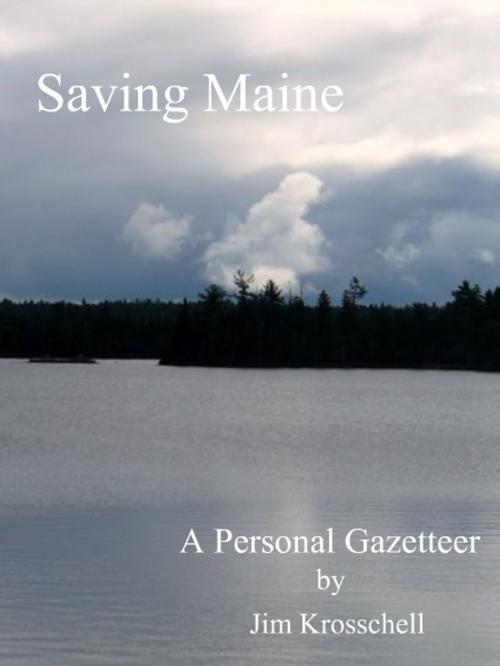Saving Maine: A Personal Gazetteer
Nonfiction, Science & Nature, Science, Biological Sciences, Environmental Science, Health & Well Being, Self Help, Self Improvement, Motivational| Author: | Jim Krosschell | ISBN: | 9781465902627 |
| Publisher: | Jim Krosschell | Publication: | June 30, 2011 |
| Imprint: | Smashwords Edition | Language: | English |
| Author: | Jim Krosschell |
| ISBN: | 9781465902627 |
| Publisher: | Jim Krosschell |
| Publication: | June 30, 2011 |
| Imprint: | Smashwords Edition |
| Language: | English |
Maine is an icon of the American imagination, resting uneasily. Only the Native Americans could be said to have lived here lightly. For nearly 500 years now, since the first landings of the Europeans, Maine’s wilderness has been explored and exploited, feared and revered. It has been the home of land-grabbers, loggers, farmers, speculators; the playground of sports and guides and rusticators and ordinary folk; the warehouse for potatoes and blueberries, pine boards and pulp. The Puritan spirit driving out of Massachusetts leveled Maine for farms and timber, then abandoned the land in the lure of the West. The forests grew back, only to be leveled again in a new frenzy for wood. Thoreau’s voice went unheeded for more than a century, until the long-haired kids spoke in the 1960s. And even then, even with all the conservation acts of the 1970s, it took another thirty years, until the turn of the 21st century, to see that some kind of peace among the companies, the conservationists, the recreationists, the residents of Maine is possible.
Until now, that is. The state of Maine is fragile. Southern Maine is being so heavily developed that it’s called northern Massachusetts. The coast is spoken for, gone largely into private hands. But most alarmingly the northern forests of Maine, 10 million acres, the last great undeveloped land east of the Mississippi, are being bought by real estate investment trusts and timber management organizations and limited liability corporations, financial entities that have loyalty to no one and interest in nothing but return on investment. These beasts – obscure and complicated enough that the State of Maine hardly knows who owns the land anymore – are planning development of resorts, second homes, and mini-malls and will not be the good stewards that Native Americans, small homesteaders, sportsmen, or even the timber companies have been.
And where will that leave the great icons of the Maine North Woods, the huge pristine lakes, the hunting camps, the moose, the brook trout and salmon, the rough logging roads, the majestic white pines, the clean air and water and wildness without which we are all so much the poorer? Is the answer a protection from our Pilgrim insatiability, in a real National Park to match the one in our minds?
There is hope. In Maine, perhaps like nowhere else in the world, there’s a chance that all the competing interests might agree on a solution that preserves wildness, promotes responsible use, even inspiration, and offers the economics of sustainability. The gorgeous icons of Maine will survive, because the grand people of Maine will ensure it. Like Thoreau we will be both starry-eyed and gimlet-eyed when we consider our future.
Maine is an icon of the American imagination, resting uneasily. Only the Native Americans could be said to have lived here lightly. For nearly 500 years now, since the first landings of the Europeans, Maine’s wilderness has been explored and exploited, feared and revered. It has been the home of land-grabbers, loggers, farmers, speculators; the playground of sports and guides and rusticators and ordinary folk; the warehouse for potatoes and blueberries, pine boards and pulp. The Puritan spirit driving out of Massachusetts leveled Maine for farms and timber, then abandoned the land in the lure of the West. The forests grew back, only to be leveled again in a new frenzy for wood. Thoreau’s voice went unheeded for more than a century, until the long-haired kids spoke in the 1960s. And even then, even with all the conservation acts of the 1970s, it took another thirty years, until the turn of the 21st century, to see that some kind of peace among the companies, the conservationists, the recreationists, the residents of Maine is possible.
Until now, that is. The state of Maine is fragile. Southern Maine is being so heavily developed that it’s called northern Massachusetts. The coast is spoken for, gone largely into private hands. But most alarmingly the northern forests of Maine, 10 million acres, the last great undeveloped land east of the Mississippi, are being bought by real estate investment trusts and timber management organizations and limited liability corporations, financial entities that have loyalty to no one and interest in nothing but return on investment. These beasts – obscure and complicated enough that the State of Maine hardly knows who owns the land anymore – are planning development of resorts, second homes, and mini-malls and will not be the good stewards that Native Americans, small homesteaders, sportsmen, or even the timber companies have been.
And where will that leave the great icons of the Maine North Woods, the huge pristine lakes, the hunting camps, the moose, the brook trout and salmon, the rough logging roads, the majestic white pines, the clean air and water and wildness without which we are all so much the poorer? Is the answer a protection from our Pilgrim insatiability, in a real National Park to match the one in our minds?
There is hope. In Maine, perhaps like nowhere else in the world, there’s a chance that all the competing interests might agree on a solution that preserves wildness, promotes responsible use, even inspiration, and offers the economics of sustainability. The gorgeous icons of Maine will survive, because the grand people of Maine will ensure it. Like Thoreau we will be both starry-eyed and gimlet-eyed when we consider our future.















